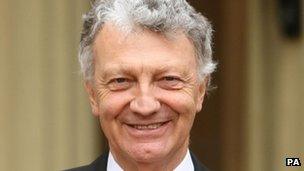Charity Commission chairman issues charity pay warning
- Published
- comments

William Shawcross questioned whether high salaries were "fair" to donors and taxpayers
Large salaries paid to charity staff could "bring the charitable world into disrepute", a regulator has warned.
Charity Commission chairman William Shawcross said organisations must ask if pay levels are "really appropriate".
The Daily Telegraph reported, external 30 staff at 14 leading UK foreign aid charities were paid £100,000 or more last year.
Charity leaders' organisation Acevo said the salaries for these "very demanding jobs" were not excessive compared to other sectors.
Mr Shawcross, who was appointed last year on a £50,000 annual salary to work two days a week, said the commission could not tell charities how much they should pay their executives, but urged them to be cautious.
"In these difficult times, when many charities are experiencing shortfalls, trustees should consider whether very high salaries are really appropriate, and fair to both the donors and the taxpayers who fund charities," he said.
"Disproportionate salaries risk bringing organisations and the wider charitable world into disrepute."
'Very demanding'
British Red Cross chief executive Sir Nick Young was paid £184,000 last year, two Save the Children executives received more than £160,000 each and Christian Aid chief executive Loretta Minghella was paid £126,072.
The number of staff being paid more than £100,000 at the 14 charities it focused on had risen from 19 since 2010, the newspaper said.
The British Red Cross said the pay of its chief executive was far from secret and its annual accounts were available on its website.
"The salary of our chief executive - which is set by the Board of Trustees, and benchmarked against, and competitive with, other non-profit organisations of similar complexity - reflects the enormous responsibility the position carries," a spokeswoman said.
A Save the Children spokesperson said: "To run an organisation that reaches 10 million children in more than 50 countries, with thousands of staff, in some of the toughest places in the world, takes real leadership, experience, knowledge and skill.
"Without this talent we would not, in the past five years, have almost doubled our income from £161m to £284m, enabling us to reach more of the neediest children on earth than at any point in our 90-year history.
"We can't - and shouldn't - compete with salaries in the private sector but we need to pay enough to ensure we get the best people to help our work to stop children dying needless deaths."
Christian Aid said "staff must reflect a large variety of abilities and disciplines" for the organisation to run successfully.
Dame Barbara Stocking, a former chief executive of Oxfam who was paid more than £100,000 a year, said she took a 30% pay cut from her previous NHS job to take up the post with the charity.
She told BBC Radio 4's World At One: "These are very demanding jobs, very long hours. The range of the business you cover, from a retail network in the UK to international situations, are hugely complex."
'Deeply unhelpful'
The 14 charities make up the Disasters Emergency Committee (DEC), which co-ordinates work after disasters overseas.
A spokesman said executive pay at its member organisations was "broadly in line" with other charities.
"To ensure the most effective use of appeal funds, a balance must be struck between minimising overheads and ensuring a robust management system is in place," he said.
"The proportion of DEC appeal funds that can be spent by member agencies on the UK management of their disaster responses is capped at seven per cent."
Sir Stephen Bubb, chief executive of the Association of Chief Executives of Voluntary Organisations (Acevo), told BBC Radio 4's Today programme that Mr Shawcross's remarks were "deeply unhelpful" and "wrong".
He said the average salary for a charity chief executive was £58,000 and the higher salaries were "entirely justified".
Sir Stephen Bubb: "Chair of Charity Commission is being deeply unhelpful"
"The big national and international charities are very demanding jobs and we need to attract the best talent to those jobs," he said.
"I know some of the people who are on these so-called excessive salaries who have taken pay cuts to run a charity."
Sir Stephen denied the high salaries could put off donors.
"This simply isn't an issue for donors. Donors are more concerned about the outcomes, the performance and the efficiency of these organisations," he added.
Every charity in England and Wales is required to publish how many members of staff earn more than £60,000 and their accounts are publicly available on the Charity Commission's website and on most charity websites.
"Many charities go further than the minimum requirements for reporting staff salary levels," a spokeswoman for the Charity Commission said.
"We would always encourage donors to use this information when making decisions about who they wish to give to and to help them understand the complexities of running any charity in the 21st century, but ultimately it is for all charities to explain the decisions they make about all forms of expenditure."
- Published5 August 2013
- Published23 March 2013
- Published21 July 2011
- Published16 October 2011